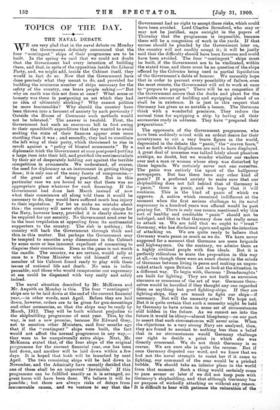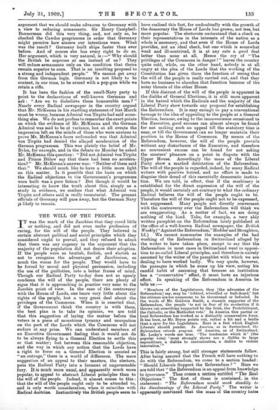TOPICS OF THE DAY
THE NAVAL DEBATE.
Ware very glad that in the naval debate on Monday the Government definitely announced that the four "contingent" ships of their programme are to be built. In the spring we said that we could not doubt that the Government had every intention of building t hem, and that, in spite of the opposition inside the Liberal Party, and, we might add, inside the Cabinet itself, they would in fact do so. Now that the Government have done precisely what they meant to do, and provided for building the minimum number of ships necessary for the safety of the country, one hears people asking :—" But why on earth was this not done at once? What sense or honesty was there in postponing an act which they had no idea of ultimately shirking? Why cannot politics be more businesslike? Why should the country have been thrown into a ferment of anxiety by such perversity ? Outside the House of Commons such methods would not be tolerated." The answer is twofold. First, the Government had such an enormous bill to foot owing to their spendthrift expenditure that they wanted to avoid making the state of their finances appear even more startling than it was ; and secondly, they had to conciliate the left wing of their party, which threatened to rise in revolt against a " policy of bloated armaments." By a diplomatic trick the Government at once postponed putting a large item into their bill, and gratified the sentimentalists by their air of desperately holding out against the terrible competition in armaments. We understand, of course, the need for diplomacy as an instrument in getting things done; it is only one of the many facets of compromise,— of the great art of being practical. But in this particular case we are bound to say that there was no appropriate place whatever for such finessing. If the Government had done last March instead of now what their consciences all along told them it would be necessary to do, they would have suffered much less injury to their reputation. For let us make no mistake about this : the country will never shrink from any charge for the Navy, however heavy, provided it is clearly shown to be required for our security. No Government need ever be iu the least trepidation at appealing from its sentimental supporters to the country. The risk is nothing ; the country will back the Government through thick and thin in this matter. But perhaps the Government may be tempted to smooth° away dissensions in the Cabinet by some more or less innocent expedient of consenting to disguise their convictions. Even so the game is not worth the candle. The country, we are certain, would rally at once to a Prime Minister who rid himself of every member of his Cabinet found ready to play with these issues of national life and death. No man is indis- pensable; and those who would compromise our supremacy at sea could be dispensed with very easily and safely indeed.
The naval situation described by Mr. McKenna and Mr. Asquith on Monday is this. The four " contingent " ships are to be laid down at the end of the current financial year,—in other words, next April. Before they are laid down, however, orders are to be given for gun-mountings and other accessories, so that the ships may be ready by March, 1912. They will be built without prejudice to the shipbuilding programme of next year. This, by the way, is not a uew promise, because Sir Edward Grey, not to mention other Ministers, said four months ago that if the " contingent " ships were built, the fact would not affect the normal programme in any way,— they were to be unequivocally extra ships. Next, Mr. McKenna stated that, of the four ships of the original programme for the current financial Tear, one has been laid down, and another will be laid down within a few days. It is hoped that both will be launched by next April. The two remaining ships will be laid down in November, and the Admiralty have recently decided that one of these shall be an improved Invincible.' If this programme can be fulfilled exactly as it is arranged, no great harm will have been done. We believe it will be possible ; but there are always risks of delays from innumerable causes, and we venture to say that the Government had no right to accept these risks, which could have been avoided. Lord Charles Beresford, who may or: may not be justified, says outright in the papers of Thursday that the programme is impossible, because - there will be a congestion of work in the yards. If that excuse should be pleaded by the Government later on, the country will not readily accept it; it will be justly said that the difficulty should have been foreseen and could have been avoided. The four "contingent" ships must be built, if the Government are to be vindicated, within the stated time, and there must be no question of the ships offered by the Colonies being used in partial liquidation of the Government's debts of honour. We earnestly hope that in order to prevent every possibility of failure, even the most remote, the Government will set to work at once " - to "prepare to prepare." There will be no congestion if the Government secure that the docks and plant for the inevitable amount of building and equipping ahead of us shall be in existence. It is just in this respect that Germany has given us so notable a lesson. The Germans think with a wonderful precision. They reduce the normal time for equipping a ship by having all their accessories ready in advance. They have "prepared their preparations."
The opponents of the Government programme, who have been suddenly seized with an ardent desire for their countrymen to cut a very brave figure in the world, • deprecated in the debate the " panic," the " craven fears," and so forth which Englishmen are said to have displayed. A great deal of nonsense was talked lately about phantom airships, no doubt, but we wonder whether our readers ever met a man or woman whose sleep was disturbed by these legends. We certainly never met one ourselves. The panic was entirely the sport of the halfpenny newspapers. But has there been any other kind of panic ? If a profound anxiety to make sure that our shipbuilding does not fall behind that of Germany is " panic," there is panic, and we hope that it will continue. This is the kind of panic of which we approve. A nation which remained indifferent at the moment when the first serious challenge to its naval supremacy in a hundred years was offered would be past - praying for. There is only one reason mentioned why this sort of healthy and creditable " panic" should not be indulged, and that is that Germany does not really mean to attack us. We are told that we ought to " trust " Germany, who has disclaimed again and again the intention ' of attacking us. We are quite ready to believe that Germany wants peace as much as we do. We have never supposed for a moment that Germans are mere brigands and highwaymen. On the contrary, we admire them as a highly civilised people with fine ideals. But it is perfectly ridiculous to state the proposition in this way at all,—as though there were an exact choice in the minds of Germans between living in peace and making an unpro- voked attack upon Britain. Let us look at the situation in a different way. To begin with, German Dreadnoughts' are built for fighting. They are not built as excursion steamers or museums of the art of war. Germans them- • selves would be horrified if they thought any one regarded them as anything but good fighting-ships. If they are • fighting-ships, they are meant to fight our ships—if necessary. But will the necessity arise ? We hope not. But it is quite certain that such a necessity might be held by Germany to have arisen in some set of circumstances still hidden in the future. As we cannot see into the • future it would be idiocy—almost blasphemy—on our part to assert that such circumstances will never arise. When • the objections to a very strong Navy are analysed, then, they are found to amount to nothing less than a belief that in no circumstances would Germany challenge our right to decide a point in which she was directly concerned. We do not think Germany is so craven. We are sure she is quite the reverse. But if once Germany disputed our word, and we knew that we had not the naval strength to resist her if it came to fighting, our command of the seas would be a pricked bubble. We should take an inferior place in the world -*! from that moment. Such a thing would certainly come to pass sooner or later if we did not keep pace with :t Germany's shipbuilding, and that although Germany has no purpose of wickedly attacking us without any reason. It is difficult to hear with patience the reiteration of the H, argument that we should make advances to Germany with a view to reducing armaments. Sir Henry Campbell- Bannerman did this very thing, and, not only so, he checked the Cawdor programme in order that Germany might perceive how sincere our intentions were. What was the result ? Germany built ships faster than ever before. And of course she has every right to do so. Her argument, which is very natural, is :—" Why should the British be supreme at sea instead of us ? They will reduce armaments only on the condition that theirs remain superior to ours. That is an insulting proposal to a strong and independent people." We cannot get away from this German logic. Germany is not likely to be content, in our time, to be armed with a pop-gun while we retain a rifle.
It has been the fashion of the small-Navy party to point to the declarations of well-known Germans and ask : " Are we to disbelieve these honourable men ? " Nearly every Radical newspaper in the country argued that Mr. McKenna in his startling statement of last March must be wrong, because Admiral von Tirpitz had said some- thing else. We do not profess to remember the exact points on which the evidence of Mr. McKenna and the German Admiral was said to be at variance, but at all events the impression left on the minds of those who were anxious to prove Mr. McKenna's fears unfounded was that Admiral von Tirpitz had denied the alleged acceleration of the German programme. This was plainly the belief of Mr. Boles, for example, and in the debate on Monday he asked Mr. McKenna this question : " Did not Admiral von Tirpitz and Prince Biilow say that there had been no accelera- tion?" Mr. McKenna's answer was: "Neither of them said that." We should much like to have a little more light on this matter. Is it possible that the basis on which the Radical objections to the Government's programme were built was a pure fiction ? But though it would be interesting to know the truth about this, simply as a study in evidence, we confess that what Admiral von Tirpitz and others said is really immaterial. The present officials of Germany will pass away, but the German Navy is likely to remain.







































 Previous page
Previous page